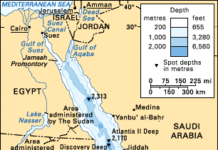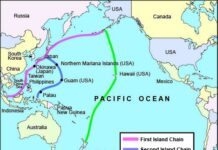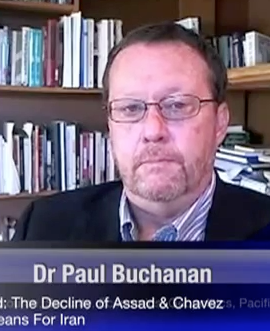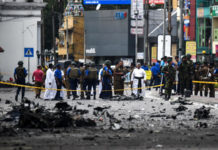Melanesia’s Leaders Approve Security Force & Position MSG Bloc To Interact Directly With Global Bodies
36th Parallel Analysis and Forecast – By Selwyn Manning.
 Security Level B: Late on Friday March 30 Melanesia’s leaders emerged from their annual summit resolute that security and progress will best be achieved by forming a stronger and secure regional bloc.
Security Level B: Late on Friday March 30 Melanesia’s leaders emerged from their annual summit resolute that security and progress will best be achieved by forming a stronger and secure regional bloc.
Melanesia’s solidarity-move counters what can be perceived as a weak point in Australia and New Zealand foreign affairs. For the first time since the end of the Cold War the Antipodean neighbours—which traditionally have been the leaders of the South Pacific community – are unable to assert significant geopolitical influence in the region, and, as a consequence, irrespective of how short-lived this period of political disengagement may be, have had their combined authority challenged by a rising community of Melanesian island states.
At the Melanesian Spearhead Group (MSG) summit, it was agreed by the leaders of Fiji, Papua New Guinea, Solomon Islands, Vanuatu, and representatives of New Caledonia’s Kanak movement to set up a regional security force. The Legion – as it will be known – will house its headquarters at a military base on the outskirts of Suva, Fiji’s capital city.
The Legion will be staffed by MSG administrators, and consist of military, police, border control and customs personnel. Fiji and Papua New Guinea will contribute the bulk of personnel to The Legion’s military and policing units.
The Legion will be deployed to quell unrest that may occur inside the MSG’s member states, and will also be on hand to investigate domestic and criminal activity of a global nature.
It is understood that the MSG’s leaders moved to ensure the region becomes as stable as is possibly so as to encourage foreign investment with MSG states and provide security for the Solomon Islands once the Regional Assistance Mission to the Solomon Islands (RAMSI) concludes its operations.
The establishment of The Legion also heralds a desire by Melanesia’s leaders to become more independent of their Australian and New Zealand neighbours and to take control of their own region’s affairs.
The Legion is part of a specific plan. The argument goes that a Legion would react swiftly to a Melanesia crisis when compared to wider regional, or United Nations-backed, assistance mission. History shows the latter are slow to gain political buy-in, slower still to achieve governmental authorization, prove to be weighed down by bureaucratic inertia at the logistics planning phase, and cause frustration among assistance needy populations when delays in troops and/or police deployment occur.
There is an added complication where wide-based assistance missions demonstrate a reluctance to disengage once a crisis has passed. As the Solomon Islands experience shows, externally controlled assistance missions can attract resistance from an ‘occupied’ state’s political elite when the latter find they are unable to control a foreign force’s exit from their jurisdiction.
Fiji Mooted The Legion Plan:

Fiji argued that The Legion should be established at a MSG sub-group meeting in March 2012.
Commodore Bainimarama’s permanent secretary for Defence, National Security and Immigration, Jale Fotofili told the MSG Police Commissioners’ Conference: “The advancement in types of crimes globally calls for a unified approach from police forces around the world,” Mr Fotofili said.
Fotofili said: “Even the spectrum of policing and the emergence of new and sophisticated crimes in the region, it is obvious that the need for collaboration and co-operation among MSG police forces is critical now than it was before.” Fotofili said the emergence of critical issues such as terrorism dramatically changed the security landscape globally. (Fiji Times)
In a statement issued by the MSG Secretariat, Fotofili’s colleague Fiji’s acting Minister for Defence, National Security and Immigration Colonel Samuela Saumatua said globalized crime and terror threats required a focused MSG regional response “the increase of travel, trade, rapid money movements, advanced telecommunications and other modernized programs… are ‘catalyst’ to intertwined illicit activities in the region of Melanesia”, he said.
Colonel Saumatua urged that the MSG police commissioners should to endorse the establishment of a regional security force. He added: “Our strategic priority is the safety, welfare and values of our people by stabilizing viable and sustainable regional security environment for stimulant economic prospects and sustainable development.” He added: “As police commissioners you have a huge responsibility to your respective governments and citizens not only in maintaining law and order but to contribute immensely in promoting an environment that is conducive for growth and national development.” (Fiji Times)
Why Establish The Legion? Why Now?
The big talk among Melanesia’ political elite is how to benefit from anticipated large deposits of exploitable deep sea natural resource which have until now been considered locked deep beyond physical reach.
With technology advancements in deep sea extraction, it is believed large resource deposits will potentially return billions of US dollars in royalties to Melanesia’s states and region-wide economy. The challenge for Melanesia leaders is how to ensure Melanesian peoples and economies receive the fruits of this exploration rather than see all profits head overseas.
Deep water mining and extraction is the latest real deal promising mega financial profits for multinational enterprise and returns via royalties for territorial economies.
36th-Parallel sources suggest multinational representatives are in discussion with the governments of Papua New Guinea, Solomon Islands, Vanuatu and Fiji over exploration rights to identify the exact locations of deep sea deposits of oil, gas, copper, gold and other mineral resources.
Additionally, representatives of Luxembourg have co-funded the Melanesian Spearhead Group’s administrative secretariat, and took part as observers and presenters at this year’s MSG leaders summit. Co-funder, the People’s Republic of China’s representatives also attended the summit.
Melanesian Spearhead Group Backgrounder:
 The Melanesian Spearhead Group (MSG) was formed in 1988 as a sub-regional bloc designed to forge a unified strategy advocating Melanesian interests within the Pacific Islands Forum (PIF) regional organization. Since 2006 the MSG has been transforming into a regional power in its own right. By 2012 the MSG had positioned to speak with authority on its sector of the Pacific, forge bilateral relationships with external powers, and to present the bloc’s credentials to global bodies. The move was initiated independent of the larger Pacific Islands Forum.
The Melanesian Spearhead Group (MSG) was formed in 1988 as a sub-regional bloc designed to forge a unified strategy advocating Melanesian interests within the Pacific Islands Forum (PIF) regional organization. Since 2006 the MSG has been transforming into a regional power in its own right. By 2012 the MSG had positioned to speak with authority on its sector of the Pacific, forge bilateral relationships with external powers, and to present the bloc’s credentials to global bodies. The move was initiated independent of the larger Pacific Islands Forum.
In the post-colonial period Melanesian Spearhead Group member states were largely dependent on Australian aid and that of other regional and external powers. The dependence has been institutionalized especially where member states’ internal political systems have been in transition from traditional forms of authority to modern Western notions of governance. Australia and New Zealand have made significant contributions toward internal development through aid funding and official secondment to local public service bureaucracies.
Australia and New Zealand public servants were tasked to administer government departments, stamp out corruption and cronyism, promote indigenous involvement, identify individuals capable of professional development, and contribute to a broad transition strategy where an island state would become ready to govern itself. The ongoing program inevitably cost Australia hundreds of millions of dollars per annum.
Papua New Guinea and the Solomon Islands have been significant benefactors of this regionalized development plan that was tightly coordinated by the Pacific Islands Forum Secretariat and controlled largely by Canberra (and to a lesser degree Wellington) via respective diplomatic corps and the Australia’s federal funding apparatus AusAid.
Generally, development goals were promising and the Pacific Islands Forum member states had moved to address the so called Arch of Instability spanning from Timor Leste in the west to Tonga in the east.
In 2005, the Pacific Islands Forum presented its regionalization plan where the PIF Secretariat would become the unified voice of its 16 member states. The move was seen as necessary when engagement with global bodies was necessary (such as with the United Nations, World Bank, and International Monetary Fund). The PIF Secretariat would consequently work as the point-entity for the region’s island states. Then New Zealand prime minister Helen Clark (currently the United Nations Development Program administrator) was a significant driver behind the initiative. It was seen as a framework that would make ti easier for PIF member states to meet the goals set out in the Pacific Plan. (PIF, October 2005)
The Tipping Point Toward Self Determination:
The Years 2005 to 2006 Were Tipping Points where the Melanesians reached a state of governance where they could assert a push toward self determination.
 By early 2006 the regionalization plan was in disarray. Australia had gained a reputation as the deputy sheriff of the US on the Pacific beat, and was prepared to demonstrate its close relationship with the George W. Bush Administration by asserting dominance over its Melanesian neighbours. The government of then prime minister John Howard began to direct the pace of change in Melanesia. This was especially so with Papua New Guinea. PNG’s transition toward ‘good governance’ ideals had been problematic and the Howard government was loathed to ‘allow’ PNG to descend into chaos or civil unrest as had occurred in the Solomon Islands. As a counter measure to civil unrest, Canberra injected millions of US dollars into Papua New Guinea in the form of targeted funds via its AusAid program. Howard and his foreign minister Alexander Downer were however dissatisfied with how the aid was handled by the PNG authorities and moved to assert control over how the funds ought to be used. This caused friction between the two countries because PNG’s prime minister Sir Michael Somare was intent on asserting his autonomy and independence, which for nationalistic reasons included public resistance to outside influence and Australian pressure was viewed as a form of interference in PNG’s internal affairs.
By early 2006 the regionalization plan was in disarray. Australia had gained a reputation as the deputy sheriff of the US on the Pacific beat, and was prepared to demonstrate its close relationship with the George W. Bush Administration by asserting dominance over its Melanesian neighbours. The government of then prime minister John Howard began to direct the pace of change in Melanesia. This was especially so with Papua New Guinea. PNG’s transition toward ‘good governance’ ideals had been problematic and the Howard government was loathed to ‘allow’ PNG to descend into chaos or civil unrest as had occurred in the Solomon Islands. As a counter measure to civil unrest, Canberra injected millions of US dollars into Papua New Guinea in the form of targeted funds via its AusAid program. Howard and his foreign minister Alexander Downer were however dissatisfied with how the aid was handled by the PNG authorities and moved to assert control over how the funds ought to be used. This caused friction between the two countries because PNG’s prime minister Sir Michael Somare was intent on asserting his autonomy and independence, which for nationalistic reasons included public resistance to outside influence and Australian pressure was viewed as a form of interference in PNG’s internal affairs.
Other MSG member states (the Solomons, New Caledonia’s FLINK separatist movement, Vanuatu and Fiji), resented Australia’s domination of their internal affairs.
By late October 2006, tension had reached its zenith.
 At the 2006 Pacific Islands Forum in Nadi, Fiji, the Australia-Melanesia relationship was tense. New Zealand emerged as a necessary interlocutor and sought common-ground among the parties. The Pacific Forum leaders summit agenda was at risk of being ripped apart which in turn threatened the continuation of the Pacific Forum’s regionalization agenda.
At the 2006 Pacific Islands Forum in Nadi, Fiji, the Australia-Melanesia relationship was tense. New Zealand emerged as a necessary interlocutor and sought common-ground among the parties. The Pacific Forum leaders summit agenda was at risk of being ripped apart which in turn threatened the continuation of the Pacific Forum’s regionalization agenda.
On arrival in Nadi to attend the PIF leaders’ summit, PNG’s Somare complained to Australian and New Zealand media that Howard and Downer had insulted his title through banning him from transiting through Australia. In turn, the Solomon Islands’ then prime minister (2006-07) Manasseh Sogavare said his position as a prime minister had been undermined by Australia when its federal police force in Honiara on RAMSI duties orchestrated a raid on his prime ministerial office.
Somare said Australia’s foreign minister Downer ordered the ban after Australian Federal Police claimed that Sir Michael had ordered PNG military craft to shuttle to safety Vanuatu’s former attorney general Julian Moti. Moti was at that time wanted by Australia on alleged child sex charges. Moreover, the Solomon Islands’ Manasseh Sogavare was a potential threat to Australia’s influence inside the Solomons. Sogavare had risen to power on a unifying nationalistic platform after the 2006 riots in Honiara. Sogavare indicated a desire for Moti to become his attorney general. Sogavare’s move was seen by the Australians as a direct challenge to their power and influence via RAMSI over the Solomon’s government and operational institutions.
Added to this complex mix, Sogavare said officers taking part in the Australian-led raid on his prime ministerial office had confiscated a fax machine and computer equipment. The Australians denied actually taking part in the raid and insisted it was carried out by Solomon Islands police while they searched on Australia’s behalf for evidence to be used in the Moti-case.
 Sogavare’s pitch to Pacific media was that the Australians had over-stepped the boundaries of their jurisdiction and were interfering in matters important to the sovereign affairs of the Solomon Islands. He stated that RAMSI had a part to play in Solomon Islands development but that parameters needed to be established, and a transitional exit strategy needed to be agreed on. He sought assistance from the Pacific Islands Forum in this regard, and New Zealand’s Helen Clark was drawn in as the mediator.
Sogavare’s pitch to Pacific media was that the Australians had over-stepped the boundaries of their jurisdiction and were interfering in matters important to the sovereign affairs of the Solomon Islands. He stated that RAMSI had a part to play in Solomon Islands development but that parameters needed to be established, and a transitional exit strategy needed to be agreed on. He sought assistance from the Pacific Islands Forum in this regard, and New Zealand’s Helen Clark was drawn in as the mediator.
On arrival in Nadi, Clark had a selection of the region’s leaders individually meet with her – including Somare, and Howard. A compromise was struck where the Australians agreed to overturn an order preventing Somare from entering Australia, while PIF leaders ratified a five-point-plan which re-structured RASMI’s involvement in Solomon Islands. Sogavare took this as a breakthrough and interpreted it to mean RAMSI, and Australia by default, had been censored and his concerns acknowledged. The PIF’s leaders summit then continued as planned. But the damage had been done to Australia’s attempts to control the agenda vis a vis the Melanesian states.
The Fiji Factor:
Meanwhile, a far more serious threat was looming for Fiji’s then prime minister Laisenia Qarase who held the prime ministership, under three specific cabinets, from 2000 to 2006 after the George Speight-led coup of May 19, 2000.
 In the Spring of 2006 Qarase’s authority was being eroded and undermined by the leader of the Republic of Fiji’s Military Forces, Commodore Voreqe (Frank) Bainimarama. Prior to the 2006 Pacific Islands Forum, the commodore had given Qarase an ultimatum that he back off a peace and reconciliation bill that would permit open testimony for those convicted of taking part in the George Speight-led Coup. It was generally believed in Fiji that the bill would allow the coupsters to be set free. Another piece of contentious legislation was the Qoli Qoli Bill which if passed by the Qarase government would permit indigenous Fijians to wander along the foreshore without risk of trespass. The Qoli Qoli bill was seen to be potentially damaging to Fiji’s tourist industry. Bainimarama demanded the immediate scrapping of both bills. Qarase refused. He limped on. He attempted to hold power while subverting the threats first by himself threatening to sack the commodore, and, secondly through a failed attempt at reconciliation. In December 2006 Bainimarama’s military forces storm government buildings and replaced Qarase’s multiparty cabinet by way of armed military coup.
In the Spring of 2006 Qarase’s authority was being eroded and undermined by the leader of the Republic of Fiji’s Military Forces, Commodore Voreqe (Frank) Bainimarama. Prior to the 2006 Pacific Islands Forum, the commodore had given Qarase an ultimatum that he back off a peace and reconciliation bill that would permit open testimony for those convicted of taking part in the George Speight-led Coup. It was generally believed in Fiji that the bill would allow the coupsters to be set free. Another piece of contentious legislation was the Qoli Qoli Bill which if passed by the Qarase government would permit indigenous Fijians to wander along the foreshore without risk of trespass. The Qoli Qoli bill was seen to be potentially damaging to Fiji’s tourist industry. Bainimarama demanded the immediate scrapping of both bills. Qarase refused. He limped on. He attempted to hold power while subverting the threats first by himself threatening to sack the commodore, and, secondly through a failed attempt at reconciliation. In December 2006 Bainimarama’s military forces storm government buildings and replaced Qarase’s multiparty cabinet by way of armed military coup.
With Bainimarama the military leader in control, Australia and New Zealand unified diplomatically and demanded Fiji restore democracy by holding immediate free elections. If it did not, sanctions would follow. Bainimarama refused to bow to Australia/New Zealand demands. Canberra and Wellington initiated sanctions. The PIF moved to establish an eminent persons group (EPG) led by PNG’s Sir Michael Somare. The group’s task was to engage with the Bainimarama regime. Fiji found itself isolated after the PIF suspended its membership. The Commonwealth of Nations followed in same. Then the United Nations (pressured by Canberra and Wellington) began to disengage Fijian soldiers from peacekeeping operations, and once the United States began decommissioning private army security contractors from the Iraq theatre Bainimarama found Fiji was suffering economically.
Bainimarama had the added complication that suddenly he had more soldiers back on Fiji soil than any leader would care to accommodate.
Bainimarama also sought alternative bilateral relationships with external powers, a move that saw Fiji become a significant benefactor of the People’s Republic of China’s expansionist geopolitical strategies.
The MSG In 2012:
Since 2006, Melanesian states have sought to solidify bilateral relationships with alternative external powers. They have largely been successful. Significant among these relationships are those with the People’s Republic of China, member states of the European Union, the Russian Federation, and members of the ASEAN bloc of economies.
If one examines the region represented by the Pacific Islands Forum there are evident divisions across the south-western Pacific. The fracture lines run between the mineral and natural resource rich Melanesian states immediately west of Fiji’s territorial waters, and the isolated and nationally individualistic Polynesian states. The situation is rendered more complex due to the diminished expression of Australian influence over Pacific regional affairs.
 Sir Michael Somare vacated the MSG’s chair to make way for Voreqe Bainimarama. The appointment elevated Bainimarama’s title from a mere military coup leader to one of regional statesman. As MSG chair, Bainimarama was able to transform his Fiji bilateral plan to one of regional dimensions. In simple terms becoming chair of the MSG gave Bainimarama more respectability and clout with a combined population of nine million. Foreign investors and external power interest suggests Melanesia is on the cusp of profiteering from a realization that new technologies can unlock valuable natural resource and mineral wealth located beneath deep territorial waters.
Sir Michael Somare vacated the MSG’s chair to make way for Voreqe Bainimarama. The appointment elevated Bainimarama’s title from a mere military coup leader to one of regional statesman. As MSG chair, Bainimarama was able to transform his Fiji bilateral plan to one of regional dimensions. In simple terms becoming chair of the MSG gave Bainimarama more respectability and clout with a combined population of nine million. Foreign investors and external power interest suggests Melanesia is on the cusp of profiteering from a realization that new technologies can unlock valuable natural resource and mineral wealth located beneath deep territorial waters.
Strategically, the Melanesian Spearhead Group has positioned Bainimarama to broker mining deals that could potentially make member states rich. The grand Melanesian plan also seeks MSG representation at global events and conventions. Its move to establish The Legion re-positions Fiji to exercise its private army peacekeeping expertise and is therefore positioned to gain significant status and revenue from the security operational plan.
This opportunity has developed ironically due to Canberra becoming preoccupied with its federal Labor-led Government’s factionalized public scrap. The sudden resignation of its foreign affairs minister Kevin Rudd from his portfolio as part of a failed move to re-take the prime ministership laid bare how divided and dysfunctional the Australian federal executive is in 2012. While Prime Minister Julia Gillard’s shrewd politicking asserted her right to power winning a decisive victory over Rudd – and while her clever loop-hole maneuver of having a New South Wales senate position suddenly open so that a non-elected Bob Carr could be appointed to the Cabinet to govern the foreign affairs portfolio and outmaneuver the opposition coalition – Australia’s divisive political wing is morally unable to target stability arguments at the Melanesians.
Australia’s divisive political wing is morally unable to target stability arguments at the Melanesians… This has not been lost on the MSG leaders.
Thus, Australia and New Zealand’s weak position has created an opportunity for the MSG to advance a plan of Melanesian unity and openly assert the need to establish a regional security force. If successful, the Legion will replace what has until now been an age of Pacific-wide regional assistance where security operations have been led and dominated by Canberra (as was the case with RAMSI).
Other Matters:
The MSG leaders also agreed to push for Fiji to be re-instated as a participant of the Pacific Islands Chiefs of Police Conference which is scheduled for August 21, 2012.
MSG leaders also agreed to support Fiji’s ‘Strategic Framework for Change’ which charts a roadmap toward a general election in 2014. It was also agreed that the MSG would “help Fiji if required through an MSG initiative”.
It was also agreed that the MSG chair, Fiji Prime Minister and military leader, Commodore Voreqe Frank Bainimarama, should attend and deliver a statement to the Rio+20 Conference.
In addition, the MSG Secretariat will develop an MSG ‘Green Growth Roadmap’ and an implementation framework for the Rio+20 protocol so as to meet institutional requirements for the MSG to access the Green Fund for climate change.
Member states of the Melanesian Spearhead Group will solidify MSG-led bilateral engagement with external powers. It will display power over its own sub-regional affairs unseen in the post-colonial period. Strategically it will seek to reduce Australian and New Zealand influence over its member states’ affairs while seeking to maintain aid assistance for capacity building and development principles. The United States of America will continue to deploy diplomats to Fiji who advocate a soft relationship building phase that offers legitimacy to Fiji’s post-coup prime minister while drawing Fiji back toward multiparty elections officially scheduled for 2014.
Links:
- ABC/Radio Australia: Paul Buchanan On China’s Investment Strategy in the South/West Pacific (2012, 36th Parallel, Buchanan)
- RAMSI in Transition: Towards Indigenous Security? (2012, 36th Parallel, Buchanan)
- Analysis: Fiji Regime’s PPP Defence Commercial Arm Targets MSG States (2012, 36th Parallel, Manning)
- Weekly Analysis: Bob Carr’s Ascension As Australia Minister of Foreign Affairs (updated) (2012, 36th Parallel, Manning
- Weekly Analysis: Commodities Boom Widens PIF Rift. (2012, 36th Parallel, Buchanan)
- The Pacific Plan, October 2005 (PIF pdf)
- Regionalism Yes – Federalism Going Too Far Says PM (2005, Scoop.co.nz, Manning)
- Australia’s Dominance Drives Wedge Among Pacific Nations (2006, Scoop.co.nz, Manning)
- Pacific Leaders Announce Review Of RAMSI – The Five Point Plan. (2006, Scoop.co.nz, Manning)











